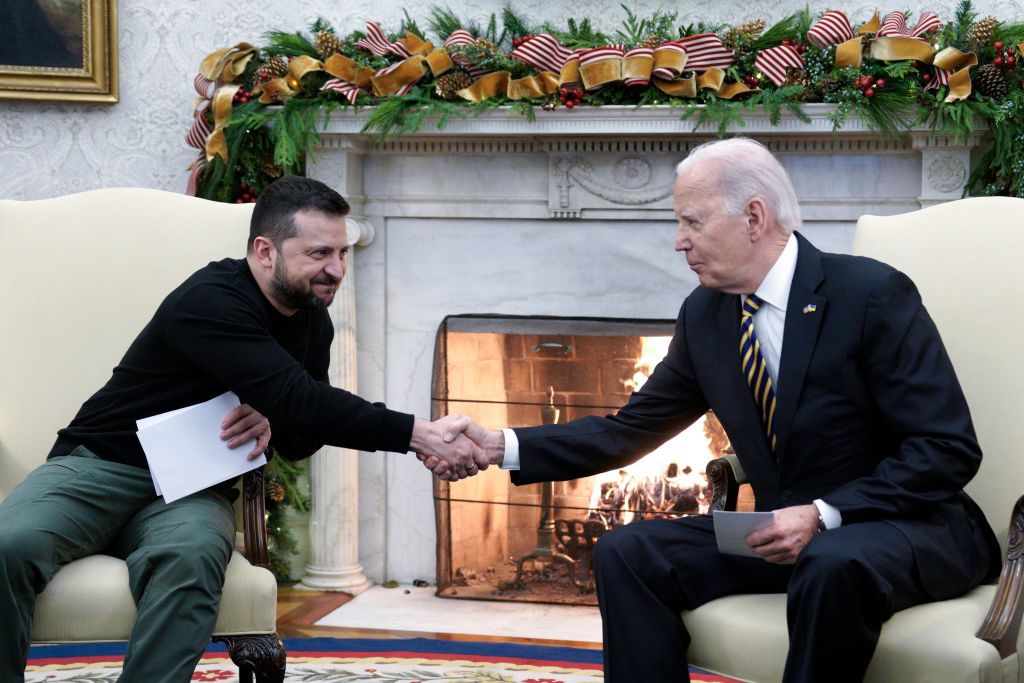Zelensky trip to DC ends in disappointment as further aid remains at risk

President Volodymyr Zelensky's visit to the U.S. on Dec. 11-12 to convince members of Congress to approve further assistance to Kyiv left the president largely empty-handed as Western aid on both sides of the Atlantic is at risk of drying up.
Republicans in the Senate blocked a bill on Dec. 6 that contained $61 billion in aid for Ukraine, largely because it did not include additional funding for domestic border security and significant changes to U.S. immigration policy.
During this visit, Zelensky met with Republican leaders in an attempt to shift opinion on Ukraine aid, but it didn't appear to have the desired effect. "I don't know whether he moved the needle at all," Republican Senator John Cornyn said.
The only assistance pledged was an additional $200 million in military aid that President Joe Biden announced from his presidential drawdown authority in what is likely one of the last of such disbursals.
Biden also signaled that the U.S.'s long-term commitment was not as rock-solid as it has been.
During his press conference with Zelensky on Dec. 12, Biden adjusted his usual wording, saying that the U.S. "will continue to supply Ukraine with critical weapons and equipment as long as we can." He added that he was not "making promises."
Up until recently, Biden emphasized that the U.S. would stand with Ukraine for "as long as it takes."
Immediately following the beginning of the full-scale invasion in February 2022, there was a broad consensus across the American political spectrum on the need to support Ukraine.
More than two years into the war, the partisan gap has widened, with both the Republican electorate being generally more likely to disapprove of the U.S.'s support for Ukraine. In recent months, this has increasingly transitioned to Republican politicians openly voicing their opposition and preventing new aid from being delivered.
The muted reaction to Zelensky's visit on Dec. 12 is a far cry from his first wartime trip to the U.S. in December 2022, where he received the red carpet treatment.
During this most recent trip, Republican Senators and Congressmen were relatively open about their beliefs that the war in Ukraine is not as important as domestic issues, namely immigration reform and increasing border security.
Republican Senator J.D. Vance, an outspoken critic of U.S. support for Ukraine, left the meeting with Zelensky early, saying he had not changed his mind about sending more aid.
House Speaker Mike Johnson, who has previously said he was in favor of aid for Ukraine, had a 30-minute one-on-one with Zelensky. Johnson said the meeting was "good" but reaffirmed his position that Biden had not sufficiently compromised on border security, which he believed to be the more important issue.
"There’s zero chance that an aid package to Ukraine and to Israel will pass the House without real meaningful – real meaningful – border security,” said Republican Senator Markwayne Mullin.
The type of changes to border security and immigration policy desired by top Republicans — described by Johnson as "transformative"— are likely to be untenable for Democrats.
Some Democratic Congressmen said they wanted to vote for Ukraine aid packages, but they could not if it included the harsh restrictions for the border wanted by Republicans, as it would go against their principles and be unpopular with the Democratic electorate.
Political pressure in the U.S. is only increasing as the presidential primary draws closer, set to officially begin on Jan. 15.
Former President Donald Trump, a vocal opponent of aid for Ukraine, has so far maintained an overwhelming lead over his rivals, the closest being governors Nikki Haley and Ron DeSantis. Haley has said she supports the U.S.'s commitment to Ukraine.
DeSantis said on Dec. 12 that supporting Israel was more important than Ukraine. When asked if he approved of Congressional inaction on Ukraine aid, he said that Republicans were "doing the right thing."
He then went on to repeat common a Republican position of how the U.S. should not be paying to "subsidize" Ukrainian farmers.
Under the umbrella of USAID, the U.S. has provided $350 million to help support the Ukrainian agricultural industry. The funds are intended to help the industry weather Russian attacks, which USAID estimated caused at least $6.6 billion in damages as of July, but also to mitigate the negative impact the war has had on the global supply of grain.
Biden has made his position on a firm commitment to Ukraine one of the cornerstones of his first-term achievements. He has condemned, in increasingly pointed language in recent months, Republican intransigence on supporting Ukraine, saying that Russian leader Vladimir Putin is "banking on the United States failing to deliver for Ukraine."
Republican Senator Lindsey Graham, who has been a vocal proponent of supporting Ukraine, expressed the impasse succinctly.
“I told President Zelensky, ‘Here’s the problem: It’s got nothing to do with you.’”











